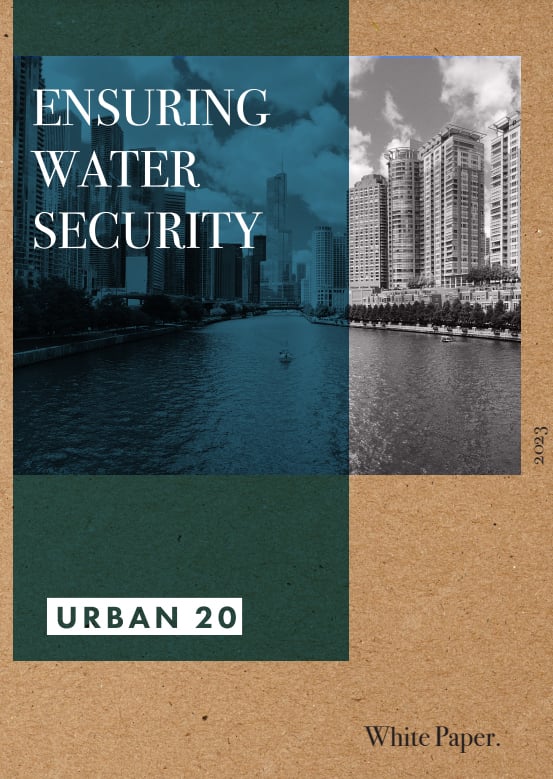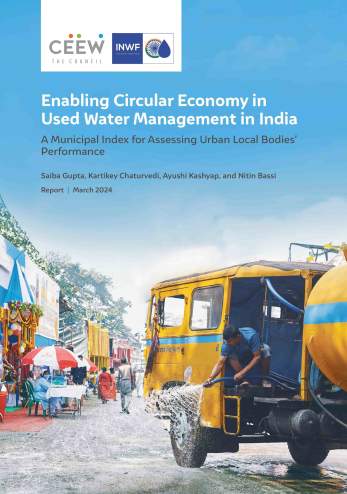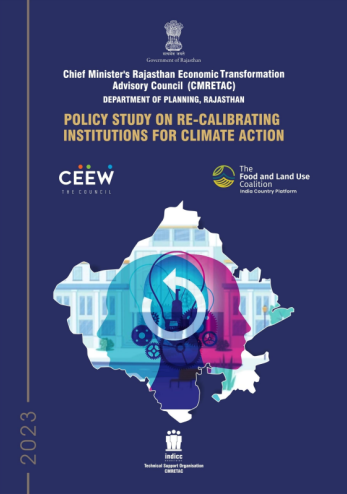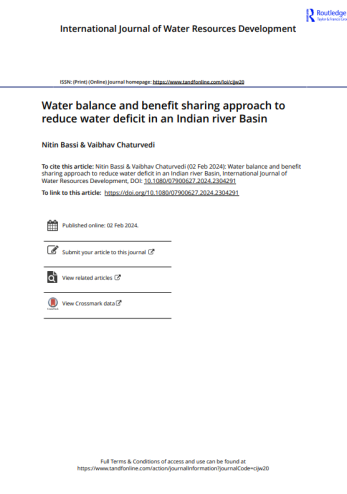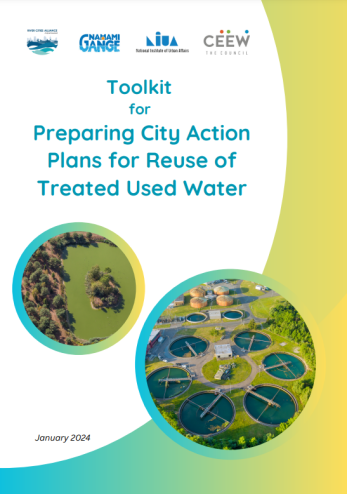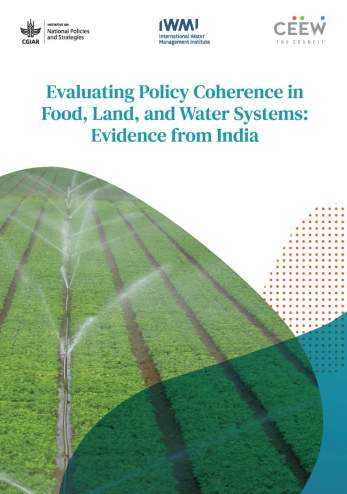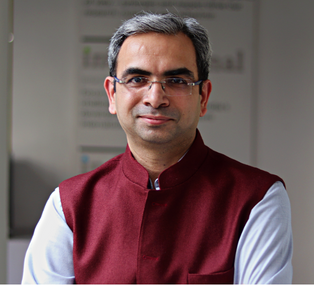Other Publications
Ensuring Water Security
U20 Task Force
July 2023 | Sustainable Water
Suggested citation: U20 Task Force. 2023. Ensuring Water Security. Urban 20 2023 White Paper.
Overview
This white paper was drafted within the priority area ‘Ensuring Water Security’ of the sixth cycle of the Urban 20 (U20) — under India’s G20 Presidency. — It aims to facilitate a change in the current water management practices in cities that are typically engineering-driven, carried out in ‘silos’, and rely on grey infrastructural interventions. For this purpose, it proposes tangible recommendations for strengthening integrated water management in cities. This includes actions to operationalise contemporary global initiatives and narratives for urban water security under a local institution and biophysical context.
Key Highlights
- G20 countries report that at least 95 per cent of their urban population is covered by safe drinking water, but only nine countries claim 100 per cent coverage. Also, about 80 per cent of the urban population in G20 countries is covered by basic and safely managed sanitation services. However, only seven out of the G20 countries report that at least 80 per cent of their urban households used water which is safely treated.
- Most of the G20 countries have low reuse of treated used water even though a significant percentage of it is treated. For instance, France, Italy, China, Germany, and the UK treat more than 95 per cent of used water but reuse is only 2-3 per cent in Italy and Germany, about 8 per cent in the UK, and 17-18 per cent in China and France. In a few countries, while the percentage of reuse is high, the volume of used water treated is very low.
- G20 nations are vulnerable to climate-induced extreme events, especially floods. China, India, Indonesia, and Japan have the highest proportion of the population vulnerable to flooding. In eleven of the G20 countries, i.e., Argentina, Australia, Brazil, Canada, France, Mexico, Japan, Republic of Korea, Saudi Arabia, USA, and the UK, more than 80 per cent of the population live in urban areas and hence are at most risk to extreme events.
- Conventional urban water management protocols practiced in some G20 countries may not necessarily be appropriate for addressing new and emerging issues such as those posed by climate change to water resources. Even those cities and countries that have performed well in water management in the past will need to be agile in terms of adapting their systems to respond to changing climate. Thus, there is a need to adopt an integrated urban water management framework.
- In urban areas of many G20 countries, especially in smaller cities, there is a lack of awareness and knowledge about the need and benefits of integrated urban water management. Water managers are not equipped well enough to handle contentious tradeoffs between economic development and environmental protection. Further, the institutional inertia and silos within the government set-up, paucity of financial resources, lack of data for informed decision-making, and piecemeal approach for addressing problems in part make it challenging to coordinate and work together towards the implementation of integrated urban water management strategies.
Key Highlights
- Re-imagine the role of water managers. Integrated urban water management requires a transdisciplinary approach for implementation, which means future water managers need to know different disciplines in addition to engineering including ecology, urban design, sociology, and landscape architecture.
- Leverage urban planning instruments to promote integrated urban water management. Traditionally, such plans have been solely concerned with land-use planning. However, in recent years these plans have emerged as a strategic enabler to influence the direction cities will take to make them more vibrant, liveable, and productive.
- Strengthen the data ecosystem within cities. The data attributes critical for integrated water management planning are land use maps, sources of water, water users by categories, water demand and wastewater infrastructure, drainage network and infrastructure, green cover, spatial spread of water bodies, source water quality, and the river ecosystem health.
- Integrate nature-based solutions in urban water management. Ecosystems such as urban forests, wetlands, water bodies, rivers, and streams, if in a healthy state, can provide several vital inputs for implementing integrated urban water management.
- Transition from mono-functional to multi-functional infrastructure. For example, the rejuvenation of a water body (e.g., a lake) can be planned in such a way that it offers multiple benefits—flood control, groundwater recharge, habitat for biodiversity, and creation of recreational spaces, among others.
- Invest in social and human capital. Cities must invest in dedicated citizen engagement initiatives to nurture a brand of water-sensitive communities and citizens. These initiatives must not stop at the typical IEC campaigns and should seek to proactively engage citizens in co-management of the urban water sector. This is important to make that shift from ‘citizens as spectators’ to ‘citizens as actors.’
- Explore non-traditional financing sources. As the financing requirement for water infrastructure required for integrated urban water management is significant, cities in G20 nations must start exploring non-traditional avenues of securing these funds such as Viability Gap Funding, Value Captured Finance, Municipal Bonds, etc.
- Encourage city partnerships and networks. Given their convening power and authority, central governments may need to take the lead in creating such networks and partnerships. Their role should be limited to facilitation, allowing the network to draw up its agenda which will ensure the autonomy of the network whilst still anchored in the national machinery.
"Given that about 2.2 billion people worldwide don’t have access to safe drinking water, the way G20 nations approach the pursuit of integrated urban water management will have far-reaching implications within the G20 community and beyond, especially to avert humanitarian, economic, and developmental challenges."




